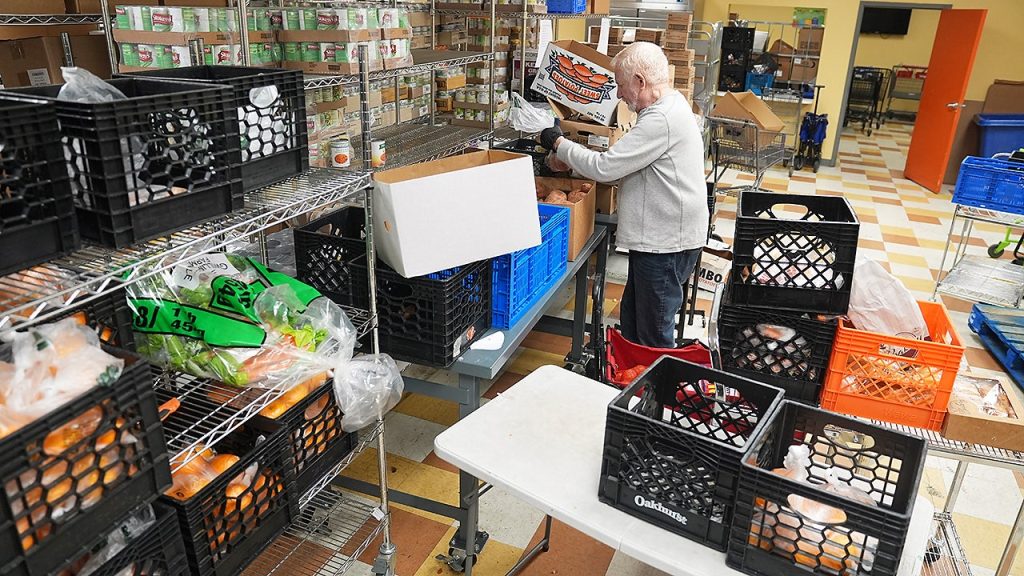Listen to the article
A federal appeals court on Friday denied the Trump administration’s request to temporarily block a lower court ruling that requires full funding of the Supplemental Nutrition Assistance Program (SNAP) during the ongoing government shutdown.
The ruling by the U.S. Court of Appeals for the 1st Circuit came as the U.S. Department of Agriculture announced it was working to comply with U.S. District Judge Jack McConnell’s order to fully fund the program for November, which supports approximately 42 million low-income Americans.
On Thursday, Judge McConnell rejected the administration’s proposal to provide only partial funding – about 65% of the roughly $9 billion needed for November benefits. The judge gave the government just 24 hours to comply with his order, stating bluntly, “People have gone without for too long.”
Following the appeals court defeat, the Trump administration escalated its challenge by filing an emergency appeal to the U.S. Supreme Court, seeking intervention by 9:30 p.m. ET Friday.
“Given the imminent, irreparable harms posed by these orders, which require the government to transfer an estimated $4 billion by tonight, the Solicitor General respectfully requests an immediate administrative stay,” an administration spokesperson told Fox News.
The USDA has begun implementing measures to comply with the court order. Patrick Penn, deputy undersecretary for USDA’s Food, Nutrition and Consumer Services, notified regional SNAP directors that the agency was “working towards implementing November 2025 full benefit issuances” and would complete necessary processes to make funds available later in the day.
The funding crisis represents an unprecedented disruption in SNAP’s 60-year history. When benefits lapsed on November 1, it marked the first time the program had halted payments. Judge McConnell criticized the administration for failing to address known distribution problems that could delay payments for weeks or months in some states, ordering the USDA to access contingency funds as needed.
During Thursday’s hearing, Judge McConnell emphasized the human cost of delaying benefits: “It’s likely that SNAP recipients are hungry as we sit here.” He later added, “The evidence shows that people will go hungry, food pantries will be overburdened, and needless suffering will occur. That’s what irreparable harm here means.”
The legal battle over SNAP funding highlights the broader impacts of the ongoing government shutdown, which has created unprecedented challenges for federal assistance programs. Food banks and community organizations across the country have reported surging demand as SNAP recipients seek alternative sources of food assistance.
The situation has particularly affected vulnerable populations, including families with children, elderly individuals, and people with disabilities who depend on SNAP benefits for their basic nutritional needs. According to hunger relief organizations, many emergency food providers were already operating at capacity before the benefits lapse, creating concerns about their ability to meet the increased need.
SNAP, formerly known as food stamps, represents one of the nation’s most critical safety net programs. The program provides monthly benefits to eligible low-income individuals and families through Electronic Benefit Transfer (EBT) cards used to purchase food at authorized retailers.
The court battle over SNAP funding comes amid a polarized political environment, with the administration previously stating that benefits would only resume when “radical left Democrats” agree to end the government shutdown. Critics have accused the administration of using vulnerable Americans as leverage in broader budget negotiations.
As the USDA works to comply with the court order, state agencies are preparing to process and distribute benefits, though the timing of when recipients will actually see funds on their EBT cards remains uncertain in many jurisdictions.
Fact Checker
Verify the accuracy of this article using The Disinformation Commission analysis and real-time sources.




14 Comments
The appeals court made the right call in rejecting the administration’s request. SNAP is a vital program that provides food assistance to those in need, and it should not be subject to political gamesmanship.
I hope the Supreme Court also upholds the lower court’s ruling and ensures SNAP funding remains intact during the shutdown.
This is good news for the millions of low-income Americans who rely on SNAP benefits. The administration’s attempt to cut funding during the shutdown was misguided and harmful.
Fully funding SNAP is the right thing to do, especially during a government shutdown when many families are struggling.
The appeals court’s decision is a clear rebuke of the administration’s callous disregard for the well-being of vulnerable Americans. SNAP is a critical safety net, and it should not be politicized.
I hope this ruling sends a strong message that the courts will not tolerate attempts to undermine essential social programs like SNAP.
This is an important victory for the millions of Americans who rely on SNAP benefits to put food on the table. The administration’s attempts to undermine the program are deeply troubling.
I applaud the courts for standing up for the rights of low-income families and ensuring they have access to the assistance they need during these difficult times.
This is a positive development in the ongoing fight to protect SNAP funding. The administration’s actions were clearly a cynical attempt to leverage the program for political gain, and I’m glad the courts have rejected it.
The importance of SNAP cannot be overstated, and I hope this ruling serves as a reminder that the government has a responsibility to ensure its citizens have access to basic necessities, even during a shutdown.
This is a victory for common sense and compassion. The administration’s attempt to cut SNAP funding was short-sighted and would have caused real hardship for millions of Americans.
I’m glad the courts are standing up for the rights of low-income families and ensuring they have access to the food assistance they need.
The appeals court’s decision is a welcome development in this ongoing battle over SNAP funding. The administration’s actions were clearly motivated by political considerations rather than the well-being of vulnerable citizens.
I hope this ruling sets a precedent that the courts will not allow the government to use SNAP as a bargaining chip during political disputes.